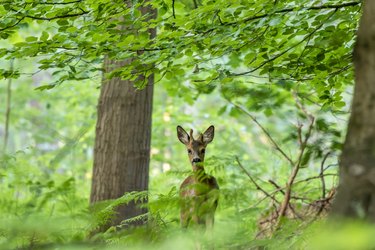
Browsing deer can inflict significant damage to young pines (Pinus spp.), though pine trees are generally resistant to members of the Cervidae family. Deer eating pine trees does happen during the winter months when snow covers low-growing shrubs and grasses. Hungry deer will munch on the tender branches, twigs and foliage of resinous evergreen trees in U.S Department of Agriculture plant hardiness zones 2 through 10. When deer eat pine trees, the foliage, needles, buds and stems will quickly regrow in spring.
Tip
Pine trees will recover from deer damage. Trim broken and damaged branches to encourage new growth and prevent pest infestations.
Video of the Day
Protect New Seedlings
Newly planted white pine trees require protection from deer, rabbits and mice; loosely wrap the trunk of the tree with wire netting or mesh. If hungry wildlife girdles the tree, it cannot survive.
Video of the Day
Pine trees can survive the damage caused by browsing deer if the top tip of the stem, also called the terminal growth point, is protected. If the terminal point is healthy and undamaged, the young pine tree will continue to grow in a vertical direction, even if most of the rest of tree has been nibbled on.
To protect the tip from ravenous deer, cut a 4-by-6 inch strip of white photocopy paper. Wrap the paper around the bud tip and staple the edges to attach it to the needles. Once the tree reaches a height of 8 to 12 feet, the terminal growth point is out of the reach of a browsing deer.
Deer Resistant Trees
Pines are actually among the most deer resistant trees, though resistance doesn't equal complete protection when food sources are low in winter. Among the deer-resistant pines is the Austrian pine (Pinus nigra 'Hornibrookiana'), a hardy, drought-tolerant species of pine tree that reaches a mature height of 60 feet. Austrian pine trees thrive in USDA zones 4 through 7.
Rarely damaged by deer, red pine (Pinus resinosa) and pitch pine (Pinus rigida) are cold-tolerant species, hardy in USDA zones 3 and 4 through 6, respectively. In warmer USDA zones 5 through 9, Japanese black pine (Pinus thunbergiana) is also highly deer resistant.
White pine trees (Pinus strobus) are also moderately resistant to deer. White pine trees present lush, deep bluish-green foliage all year long. The tree reaches a mature height of 50 to 80 feet tall in USDA zones 3 through 8.
Pine Tree Maintenance
In addition to eating the foliage and tender young branches, during the fall mating season, male deer rub their antlers on tree bark to mark their territory and to establish dominance over other male deer.
Protection and maintenance can help mitigate the damage deer can cause to pine trees. Malnourished or diseased trees are not as resistant to deer, insects or other environmental stresses. Sterilize pruning tools by dipping the blades in rubbing alcohol or Lysol, then trim dead branches. Provide adequate water and control competitive grasses and weeds around the base of the tree.
Deer Repellents to Protect Trees
Discourage deer from feasting on your pine trees by sprinkling carnivore scent around the base of the tree. Bear, cougar, wolf and coyote are natural deer predators. Carnivore-scent blocks or sprays are available online or for purchase from local hunting-supply stores. Do not put out deer feeders to entice deer to visit your property.
A plastic or PVC-coated metal fence can help protect the garden from deer. It must be at least 7 1/2 to 8 feet tall to discourage deer from just leaping over the barrier. Add automated lights or sprinkler systems to discourage nocturnal foraging.
- Rutgers New Jersey Agricultural Experiment Station: Landscape Plants Rated by Deer Resistance
- North Carolina Extension Gardener Plant Toolbox: Pinus Strobus
- New Hampshire Extension: Deer Damaged a Number of Plants in My Garden Over the Winter. What Can I Do to Prevent This From Happening Again?
- University of Michigan Extension: How to Manage Deer Damage on Trees and Other Plants